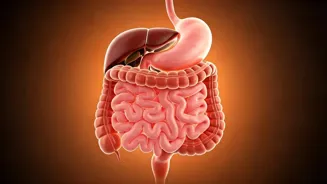Savor Every Bite
The first habit suggested to combat post-meal bloating is mindful eating, often emphasized by experts. Eating slowly and consciously, really taking in the
flavors and textures of your food, is key. When you eat quickly, you might end up consuming more food than needed, increasing the chance of bloating. Focusing on chewing thoroughly and enjoying the meal can aid digestion and signal fullness. Try to minimize distractions, like screens or conversations that draw your attention away from your food. This allows your body to better process the meal and reduce the possibility of uncomfortable bloating.
Hydrate Mindfully
Drinking water is essential, but the timing matters when it comes to preventing bloating. The cardiologist advises against drinking excessive amounts of water immediately before, during, or right after a meal. This can dilute digestive enzymes and slow down the digestive process, potentially leading to bloating. Instead, they suggest drinking water around meals, such as 30 minutes before and an hour after eating. This helps to keep your body hydrated without interfering with digestion. Ensuring adequate hydration is important for overall health, but managing when you drink water is crucial for reducing bloating.
Gentle Movement
Incorporating gentle movement into your routine after meals can benefit your digestion. Engaging in a short walk or a light activity like stretching can encourage bowel movements and lessen bloating. Avoid intense workouts right after eating, as they can divert blood flow away from the digestive system, which is not ideal for efficient digestion. A short walk of 10-15 minutes post-meal can make a considerable difference. This small change helps the food move through the digestive tract more smoothly, decreasing the feeling of fullness and discomfort.
Watch Your Portions
Controlling your portion sizes is another useful approach to tackle bloating. Overeating can overburden your digestive system, causing bloating and discomfort. Eating smaller, more frequent meals throughout the day may be better than consuming large meals. Pay attention to your body's hunger and fullness cues. Practicing portion control doesn't always mean a rigid diet, but it’s about being aware of how much you're eating. Using smaller plates can naturally help in reducing portions. Eating mindfully and eating until you’re satisfied, not stuffed, is key for digestive comfort.
Fiber Balance Matters
While fiber is good for health, the quantity and type you consume can influence bloating. A sudden boost in fiber intake, particularly from supplements, might cause bloating, gas, and discomfort. Gradually increasing your fiber intake, from foods like fruits, vegetables, and whole grains, is the recommended method. Drink plenty of water as you boost your fiber intake. This helps prevent constipation and makes sure your digestive system is working well. If you use fiber supplements, introduce them slowly and monitor how your body responds to avoid bloating.
Reduce Processed Foods
Processed foods often contain high amounts of sodium, which leads to water retention and bloating. Many processed foods also contain artificial sweeteners or additives that can trigger digestive issues in some people. Cutting down on processed foods and opting for whole, unprocessed alternatives is a useful approach. Reading food labels is also essential. This helps you become conscious of the sodium and ingredients that might be contributing to bloating. Focusing on fresh, whole foods enhances your digestive well-being.
Stress Management Techniques
Stress can greatly impact digestion. When you're stressed, your body produces cortisol, a hormone that can slow down digestion and cause bloating. Finding healthy ways to handle stress, like deep breathing, meditation, or gentle yoga, helps improve digestion. Practicing stress-reduction methods before meals can set a relaxed atmosphere, which aids digestion. Dedicating a few minutes each day to relaxation promotes better digestion and reduces the chance of post-meal bloating. Taking care of your mental health is as vital as your physical health to avoid digestive problems.













